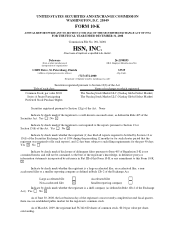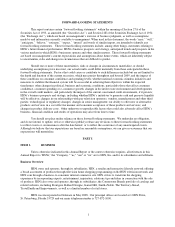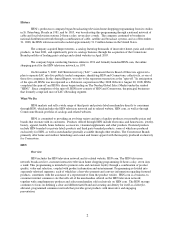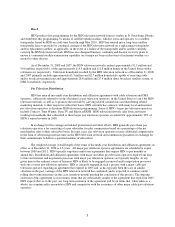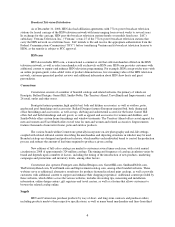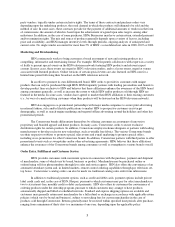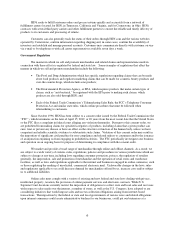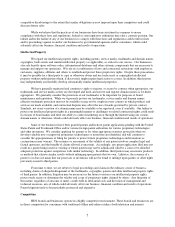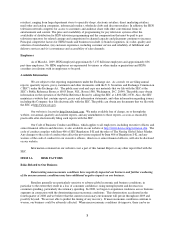Home Shopping Network 2008 Annual Report Download - page 9
Download and view the complete annual report
Please find page 9 of the 2008 Home Shopping Network annual report below. You can navigate through the pages in the report by either clicking on the pages listed below, or by using the keyword search tool below to find specific information within the annual report. 6
HSNi seeks to fulfill customer orders and process returns quickly and accurately from a network of
fulfillment centers located, for HSN, in Tennessee, California and Virginia, and for Cornerstone, in Ohio. HSNi
contracts with several third party carriers and other fulfillment partners to ensure the reliable and timely delivery of
products to its customers and processing of returns.
Customers can also generally track the status of their orders through HSN.com and the various websites
operated by Cornerstone, confirm information regarding shipping and, in some cases, confirm the availability of
inventory and establish and manage personal accounts. Customers may communicate directly with customer service
via e-mail or by telephone or with call center representatives available seven days a week.
Government Regulation
The manner in which we sell and promote merchandise and related claims and representations made in
connection with these efforts is regulated by federal and state law. Some examples of regulations that affect the
manner in which we sell and promote merchandise include the following:
• The Food and Drug Administration which has specific regulations regarding claims that can be made
about food products and regulates marketing claims that can be made for cosmetic beauty products and
over-the-counter drugs, which include acne products;
• The Environmental Protection Agency, or EPA, which requires products that make certain types of
claims, such as “anti-bacterial,” be registered with the EPA prior to making such claims, which
products are also sold through HSN; and
• Each of the Federal Trade Commission’s Telemarketing Sales Rule, the FCC’s Telephone Consumer
Protection Act and similar state rules, which outline procedures that must be followed when
telemarketing to customers.
Since October 1996, HSN has been subject to a consent order issued by the Federal Trade Commission (the
“FTC”), which terminates on the later of April 15, 2019, or 20 years from the most recent date that the United States
or the FTC files a complaint in federal court alleging any violation thereunder. Pursuant to this consent order, we
are prohibited from making claims for specified categories of products, including claims that a given product can
cure, treat or prevent any disease or have an effect on the structure or function of the human body, unless we have
competent and reliable scientific evidence to substantiate such claims. Violation of this consent order may result in
the imposition of significant civil penalties for non-compliance and related redress to consumers and/or the issuance
of an injunction enjoining us from engaging in prohibited activities. The FTC periodically investigates our business
and operation on an ongoing basis for purposes of determining its compliance with the consent order.
We market and provide a broad range of merchandise through online and offline channels. As a result, we
are subject to a wide variety of statutes, rules, regulations, policies and procedures in various jurisdictions which are
subject to change at any time, including laws regarding consumer protection, privacy, the regulation of retailers
generally, the importation, sale and promotion of merchandise and the operation of retail stores and warehouse
facilities, as well as laws and regulations applicable to the internet and businesses engaged in online commerce, such
as those regulating the sending of unsolicited, commercial electronic mail. Unfavorable changes in the laws, rules
and regulations applicable to us could decrease demand for merchandise offered by us, increase costs and/or subject
us to additional liabilities.
Online sales must comply with a variety of existing and new federal and state laws dealing with privacy,
intellectual property, taxation, the provision of online payment services and electronic contracts. While U.S.
Supreme Court decisions currently restrict the imposition of obligations to collect state and local sales and use taxes
with respect to sales made over the internet, a number of states, as well as the U.S. Congress, have adopted or are
considering initiatives that would impose sales and use tax collection obligations arising from internet-based
transactions. The imposition by the federal or state and local governments of various taxes and related obligations
upon internet commerce could create administrative burdens for our businesses, could put our businesses at a

